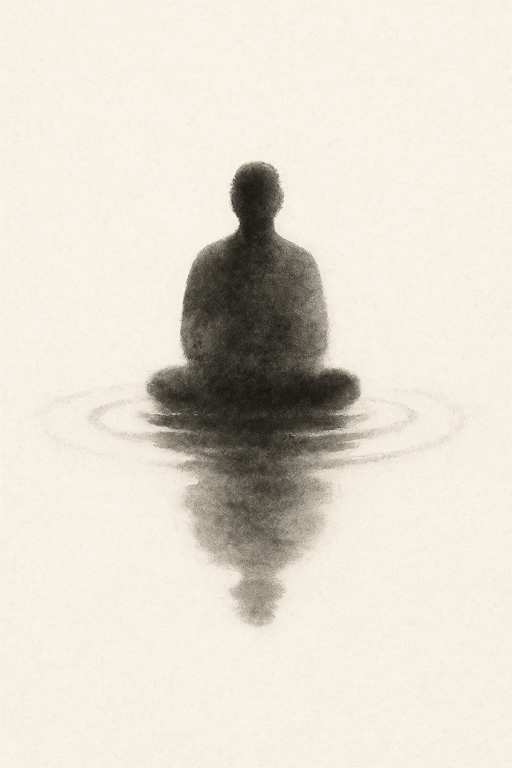
The awakened ones who came before us — Buddha, Jesus, Nanak, Krishnamurti — all spoke from the same place. It was not a location in space, but a state of being: the centre that does not move. They saw from there, spoke from there, and returned to silence when the words were done.
There is a place in the mind where nothing moves. Not silence as the opposite of sound, not calm as the opposite of agitation, but the ground before either appears.
This is the centre. The one that does not come and go. The one that does not begin and does not end.
Buddha sat in this. Jesus spoke from this. Nanak sang from this. Krishnamurti pointed to this.
They did not teach a method. They did not create a path. They did not offer a belief.
They simply did not move away from the centre.
The world moved. Life unfolded. Speech came. But the centre remained still.
This is why their words do not decay. They are not personal. They are not held up by identity. They are not shaped out of memory.
They emerge directly from the unmoving ground.
No lean. No reaching. No becoming.
Only the natural expression of awareness when it is not forming a self.
We begin here.
They did not speak to convince. They did not speak to guide. They did not speak to lead others somewhere.
Speech arose the way breath arises: naturally, without intention.
When the centre is still, words are not crafted. They arrive. They appear as needed and disappear when they are finished.
There is no speaker inside. There is no one choosing what to say. There is only speaking.
This is why their words have no weight on the mind. Even when they cut deeply. Even when they undo everything you believe.
The words do not carry a self. And so the listener does not feel defended.
It is not one person speaking to another. It is awareness recognising itself.
This is why people cried in their presence. Not from devotion. Not from worship. Not from emotion.
But because, for a moment, the movement of becoming stopped. And they tasted what had always been here.
The centre speaking. The centre hearing. The centre recognises itself.
No distance. No one in between. No effort at all.
Each one expressed the centre differently. But the place they spoke from was the same.
Buddha spoke in stillness. His words were spare, clean, without ornament. A reflection of the mind that does not reach.
Nanak sang. His voice moved the way water moves around stone, without effort and without interruption. Song was the most natural form for truth to take in him.
Jesus spoke with presence that dissolved the listener. Not persuasion. Not authority. Just a depth of being so silent that the self could not stand in front of it.
Krishnamurti spoke like clear light. Not poetry. Not scripture. Only the movement of the mind revealed in real time.
Different language. Different time. Different culture. Different expression.
Same centre.
The river takes the shape of the land it flows through. But the water is the same.
Truth takes the shape of the one who expresses it. But the ground it rises from does not change.
It is the same ground in you. Right now.
Not in some future moment. Not after purification. Not after understanding.
But here. Before the mind leans. Before the self arranges itself. Before the world is remembered.
The centre does not need to be found. It is what remains when nothing is being held.
When the centre remains, life does not become still. The world does not pause. The senses do not stop.
Only the movement of becoming ends.
There is thought, but no thinker. There is action, but no actor. There is speech, but no speaker.
Life continues in its natural rhythm. Simple. Unforced. Unbroken.
You do not withdraw. You do not rise above. You do not transcend.
You simply do not lean.
Without the lean, there is no self to maintain. No identity to protect. No image to uphold.
You move through the world without being moved by it.
This is how they lived. Not as teachers. Not as enlightened beings. Not as figures of reverence.
But as those who did not leave the centre.
They walked. They ate. They sat. They spoke. They rested. They breathed.
Just as you do.
The difference was only this: They saw the movement of the self begin — and they did not follow it.
No practice. No suppression. No effort.
Just the simple recognition:
The centre does not move.
And so they remained where everything begins. And everything returns.
The place you are now.
The place you have always been.
The One Who Does Not Come and Go
Buddha did not call himself enlightened. He did not call himself a teacher. He did not call himself a guide.
He used one word:
Tathāgata — the one who does not come and does not go.
Not as a title. Not as a role. Not as something to become.
But as a description of the centre.
The centre does not arrive. It does not depart. It does not begin or end. It does not become anything.
Only the movement of the mind comes and goes. Only the self appears and disappears. Only identity forms and dissolves.
The centre remains.
When Buddha said “Tathāgata,” he was simply speaking from the place that does not move.
The same place that speaks now.
The one who has gone nowhere.
The one who has always been here.
